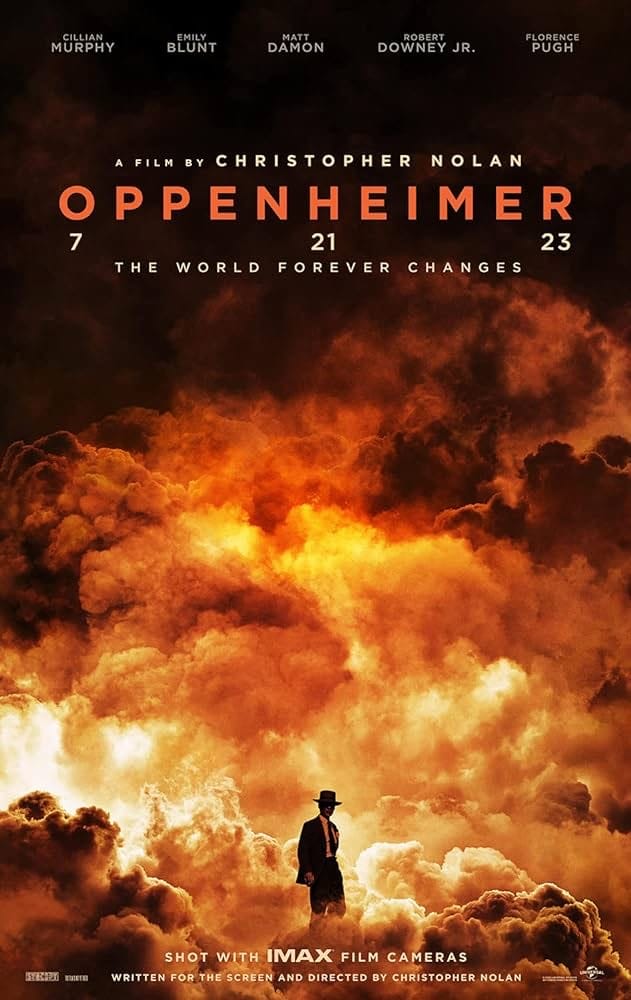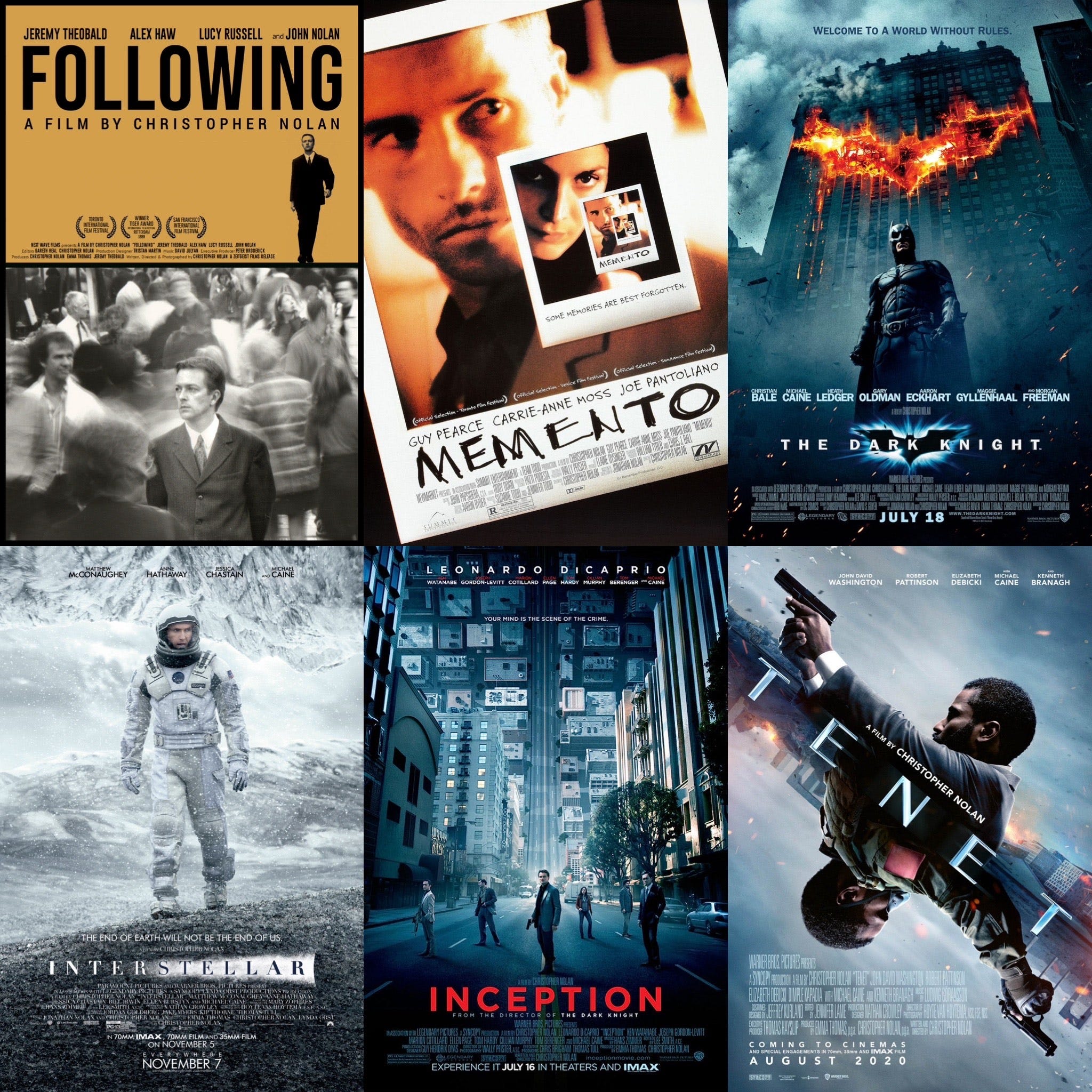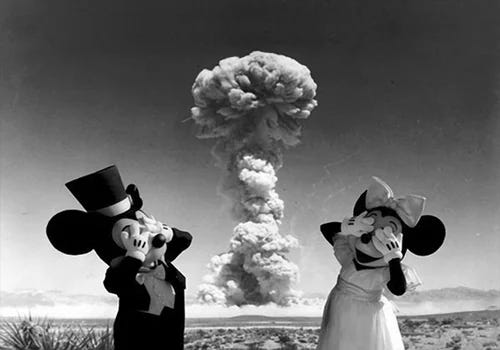Oppenheimer
“Now I am become Death, the destroyer of worlds.”

During World War II, Lt. Gen. Leslie Groves Jr. appoints physicist J. Robert Oppenheimer to work on the top-secret Manhattan Project. Dr. Oppenheimer and a team of scientists spend years developing and designing the atomic bomb. Their work comes to fruition on July 16, 1945, as they witness the world's first nuclear explosion, forever changing the course of history.
I really started being interested in film in earnest in the mid-to-late 90s, about the same time Christopher Nolan started making features. Due to his start in the late 90’s indie film boom—so, much like Tarantino, Spike Lee, even Kevin Smith, among others—me following his long career just kind of dovetailed together.

I saw Following in 1998 at the Nuart in L.A. on opening night. It was a no big deal kind of premiere, a little nothing film from a nobody director and a cast of unknowns, and my buddy Sam and I got in easily, without even showing up early, just like any other movie. Nolan was there, unsurprisingly, as it was his first real film, and he did a little Q&A afterwards, which was interesting, especially when he mentioned that they shot the film every weekend over the course of a year, which really emphasized not only the incredibly impressive organization needed to maximize weekend shoots, but the production’s continuity tracking. The effort and care involved in keeping track of that? Impressive. Anyway, this kind of attention to detail is one of Nolan’s hallmarks, one that seemingly goes hand-in-hand with maybe his most distinctive hallmark…
Which is the somewhat emotionally distant feel that comes with his films.
I loved Memento, of course, everyone did. That’s the film he made his bones on. We used to turn people away from the theatre if they showed up late for a showing, as it would undermine the film’s experience by walking in late. It was a whole thing, and people would get so mad. Tough titty. pal. And like Following, Memento was a little emotionally cold, most likely due to the main character’s nature, but still… this is who Nolan is. He went on to make maybe the best Batman movie ever, with maybe the best Joker too, but again, Batman isn’t exactly the most emotional guy, so… here’s another emotionally distant film. Interstellar was a big deal, but the fact that it all hinged on love or whatever it was just totally fell flat for me. Why? Because Nolan is a bit of a cold and emotionless filmmaker, and he just didn’t sell it. My main memory now of Interstellar was that some online nerd was fucking livid—like the red-faced and spitting kind of apoplectic—that a film that was about trying to find a new world to settle on, because the Earth was dying, did not also spend an equal amount of time presenting several viable options for staying and saving the planet, and no amount of explaining that this was simply the fictional story that the film chose to tell made any difference at all to this fucking dunderhead. At first, I thought they were joking, doing a bit, but nope, all they could see was red, and they ranted and raved and claimed it was a socially irresponsible film. I sometimes wonder where that dumb shit is now… Anyway, I loved Inception too, even though the story was kind of dumb once you map it out a little, and the “mystery” of the top at the end of the film was so obvious, the fact it was a “mystery” at all to people was kind of embarassing, but again… Inception was a film of muted tones and colors, and most importantly, muted emotions. Tenet, I’ll admit it, dulled the shit out of me. I honestly don’t remember any of it, except for a lot of calm-voiced dudes talking at great length at each other about nonsense. Was it cold, muted, and at-arm’s-length emotionally? I don’t remember it well enough to say definitively, but I’d be willing to bet that it was.
My point is… I have a long history of seeing and mostly enjoying many of Christopher Nolan’s films over the years while following his deserved rise through Hollywood. As a result, I am very familiar with his work.
So, in a nutshell, I knew what to expect walking in to Oppenheimer, I got what I was expecting, and I really liked it.
It’s a fantastic film, but like most of his films, it did feel emotionally cold to me. Maybe “cold” is a little too strong, maybe “at arm’s length” is a better descriptor. But right now, I can’t help but notice how, where Scorsese’s latest film recounts a moment of history through the emotions of the characters, Nolan seems much more at home dramatizing the facts. Where the former feels like a window through time to see real people, the latter is more of an engrossing retelling of a historical event.
Is this a bad thing? No, but still… it is a thing.
There isn’t a lot for me to say about the plot itself. We all pretty much know the story. The film spans a big chunk in the life of Dr. Oppenheimer, from his early years, to the Manhatten Project, and then to his abuse at the hands of our government due to the bruised egos and petty vendettas of the little piss-babies who make up that hallowed institution. It’s probably fair to say, the reason this film feels so emotionally distant to me is most likely due to the fact it covers so many years of the man’s life, necessitating a much broader perspective, so sure, yeah, that’s fair, but also, this is my entire point… that’s Nolan’s style.
In the end, for me at least, the film seemed mostly concerned with Dr. Oppenheimer’s colossal naïveté when it came to the actual meaning of his life’s work, and his colossal sociopathy from a life immersed in theory, highlighted by moments like when they discuss and accept the near zero chance risk that they might destroy the entire world the first time they ignite the bomb. All of this seems aimed at ultimately allowing the man to take the position as not just as the Father of the Bomb, but ultimately as its Pontius Pilate too—to wash his hands and seal his fate, as that one guy says, you can probably guess his name. It’s the story of a man who was too busy thinking about whether or not they could do it, to be bothered with truly considering if they should do it, as that massive and terrible bloom of fire, and the ashes and shadows that came after, were only theoretical for them during the Bomb’s creation. His guilt afterwards, while understandable, felt more akin to begging for forgiveness once the milk has been well and truly spilled.
“Try not to blow up the world” says Gen. Leslie R. Groves.
Oops…
I did read some complaints that the film didn’t show the reality of what actually happened in Hiroshima and Nagasaki, and that’s true, the film doesn’t spend any time there, but this is Dr. Oppenheimer’s story, so why would it? As far as I know, he never went there, so the “at-arm’s-length” discussion condeming hundreds of thousands to death in atomic fire was all there ever was.
The theory is all he ever truly dealt with.
Still, “theory will only take you so far” as the film itself says, so by not showing the audience the reality of the Bomb on Hiroshima and Nagasaki, those consequences are kept at arm’s length for the audience too. It’s much easier to understand and to forgive when you don’t have to see the shadows of child’s foot burned into her strangely untouched little wooden clog, right? By keeping it all theoretical, it’s easier to empathize with him, right?
But also… it was war.
The scientists at the Manhattan Project were, at least theoretically, very much working under the gun to finish. The threat that someone else, like the Germans or the Russians, would accomplish their task before they could, and then use the result on America was an ever-looming one, so it’s really easy to armchair quarterback that shit now, but in that moment, it’s also easy to understand the drive. But that doesn’t change the fact that the terrible cost of using this weapon was barely considered, that the effect that its use, its very existence, could have on the world, including dooming it all to nuclear fire… was merely academic. Nothing more than theory. So, it’s fair to ask, why should the audience get to see it? Why should the audience be allowed the sanctity of hindsite’s moral high ground? Besides, let’s be honest here, it’s not like Americans have ever truly been interested in seeing that reality anyway…
Right?

This ambiguity as to the motivations and righteousness of the main players is a fair addition to the film’s tale, but coupled with the multiple-decade narrative stretch, this is also why the film feels a little emotionally cold to me, which could be considered to be a ding against it, especially when you consider that it’s a film that is powered by nuclear fire…
Still, Oppenheimer will probably sweep the Oscars.
Again… not undeservedly, because it is a great film, and regardless, it has the momentum and the narrative in the press, not to mention that the academy has already shown its hand with its myriad of typical snubs. The fact is… Oppenheimer is an old school Hollywood film, filled with glitz and glamour, beautiful shots, and pure star power wattage. It is a critically, and most importantly, financially successful film, an ode to America’s greatness (and to its “vague, but excusable” shame) centered on the brooding regret of a flawed and historically notable white man, in a production that is backed by a sprawling cast of extremely talented and well-known (and mostly white) men, all of which is directed by a white man who has already established his bonafides in the field. It’s everything Old Hollywood loves and values, which is who makes up the majority of Academy Voters.
The only missing element that the Academy Voters would’ve loved more would have been if the story was somehow also about Hollywood itself.
Now, just to be clear… Am I saying here that the only reason Nolan will most likely sweep the Oscars with this film is because he is a white man, making a film about a white man, in a movie that largely features men, most of them white, in a film where, of the only two women who really even appear as a character, one is mostly portrayed as a bitch, while the other mostly has her titties out? Is that the only reason it will win? Is that what I’m saying?
No, of course not.
That would be asinine, especially since it’s long been clear that Nolan is incredibly talented, with a track record to match, and every moment of this film showcases that, as do the multiple incredible performances it contains, but also… it certainly didn’t fucking hurt him either, did it?
But I digress…
In the end, Oppenheimer is an incredible film, although, for my taste, not one I will revisit often, if ever, but regardless of that, when it sweeps the Oscars, it will certainly deserve the majority of those wins.

